| Listing 1 - 10 of 19 | << page >> |
Sort by
|
Book
ISBN: 1280803495 9786610803491 0387271309 Year: 2005 Publisher: New York : Springer,
Abstract | Keywords | Export | Availability | Bookmark
 Loading...
Loading...Choose an application
- Reference Manager
- EndNote
- RefWorks (Direct export to RefWorks)
"... The exposition is not only clear, it is friendly, philosophical, and considerate even to the most naive or inexperienced reader. And it proves that the philosophical orientation of an author really can make a big difference. The mathematical content is intensely classical. ... Edwards makes it warmly accessible to any interested reader. And he is breaking fresh ground, in his rigorously constructive or constructivist presentation. So the book will interest anyone trying to learn these major, central topics in classical algebra and algebraic number theory. Also, anyone interested in constructivism, for or against. And even anyone who can be intrigued and drawn in by a masterly exposition of beautiful mathematics." Reuben Hersh This book aims to promote constructive mathematics, not by defining it or formalizing it, but by practicing it, by basing all definitions and proofs on finite algorithms. The topics covered derive from classic works of nineteenth century mathematics---among them Galois' theory of algebraic equations, Gauss's theory of binary quadratic forms and Abel's theorem about integrals of rational differentials on algebraic curves. It is not surprising that the first two topics can be treated constructively---although the constructive treatments shed a surprising amount of light on them---but the last topic, involving integrals and differentials as it does, might seem to call for infinite processes. In this case too, however, finite algorithms suffice to define the genus of an algebraic curve, to prove that birationally equivalent curves have the same genus, and to prove the Riemann-Roch theorem. The main algorithm in this case is Newton's polygon, which is given a full treatment. Other topics covered include the fundamental theorem of algebra, the factorization of polynomials over an algebraic number field, and the spectral theorem for symmetric matrices. Harold M. Edwards is Emeritus Professor of Mathematics at New York University. His previous books are Advanced Calculus (1969, 1980, 1993), Riemann's Zeta Function (1974, 2001), Fermat's Last Theorem (1977), Galois Theory (1984), Divisor Theory (1990) and Linear Algebra (1995). Readers of his Advanced Calculus will know that his preference for constructive mathematics is not new.
Constructive mathematics. --- Mathematics. --- Algebra. --- Algebraic geometry. --- Sequences (Mathematics). --- Mathematical logic. --- Number theory. --- Mathematics, general. --- Algebraic Geometry. --- Sequences, Series, Summability. --- Mathematical Logic and Foundations. --- Number Theory. --- Number study --- Numbers, Theory of --- Algebra --- Algebra of logic --- Logic, Universal --- Mathematical logic --- Symbolic and mathematical logic --- Symbolic logic --- Mathematics --- Algebra, Abstract --- Metamathematics --- Set theory --- Syllogism --- Mathematical sequences --- Numerical sequences --- Algebraic geometry --- Geometry --- Mathematical analysis --- Math --- Science --- Mathematics, Constructive --- Logic, Symbolic and mathematical --- Geometry, algebraic. --- Logic, Symbolic and mathematical.
Book
ISBN: 0898740479 9780898740479 Year: 1980 Publisher: Huntington (N.Y.): Robert E. Krieger,
Abstract | Keywords | Export | Availability | Bookmark
 Loading...
Loading...Choose an application
- Reference Manager
- EndNote
- RefWorks (Direct export to RefWorks)
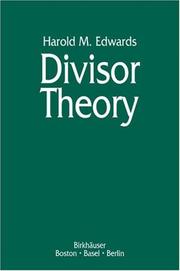
ISBN: 0817634487 081764976X 0817649778 9780817634483 Year: 1990 Publisher: Boston (Mass.): Birkhäuser,
Abstract | Keywords | Export | Availability | Bookmark
 Loading...
Loading...Choose an application
- Reference Manager
- EndNote
- RefWorks (Direct export to RefWorks)
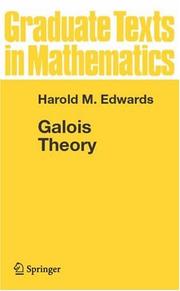
ISBN: 038790980X 354090980X 9780387909806 Year: 1984 Volume: 101 Publisher: New York (N.Y.): Springer,
Abstract | Keywords | Export | Availability | Bookmark
 Loading...
Loading...Choose an application
- Reference Manager
- EndNote
- RefWorks (Direct export to RefWorks)
Galois theory --- Théorie de Galois --- 512.62 --- Fields. Polynomials --- 512.62 Fields. Polynomials --- Théorie de Galois
Book
ISBN: 0817684115 0817684123 Year: 2014 Publisher: Boston, MA : Birkhäuser Boston : Imprint: Birkhäuser,
Abstract | Keywords | Export | Availability | Bookmark
 Loading...
Loading...Choose an application
- Reference Manager
- EndNote
- RefWorks (Direct export to RefWorks)
In a book written for mathematicians, teachers of mathematics, and highly motivated students, Harold Edwards has taken a bold and unusual approach to the presentation of advanced calculus. He begins with a lucid discussion of differential forms and quickly moves to the fundamental theorems of calculus and Stokes’ theorem. The result is genuine mathematics, both in spirit and content, and an exciting choice for an honors or graduate course or indeed for any mathematician in need of a refreshingly informal and flexible reintroduction to the subject. For all these potential readers, the author has made the approach work in the best tradition of creative mathematics. This affordable softcover reprint of the 1994 edition presents the diverse set of topics from which advanced calculus courses are created in beautiful unifying generalization. The author emphasizes the use of differential forms in linear algebra, implicit differentiation in higher dimensions using the calculus of differential forms, and the method of Lagrange multipliers in a general but easy-to-use formulation. There are copious exercises to help guide the reader in testing understanding. The chapters can be read in almost any order, including beginning with the final chapter that contains some of the more traditional topics of advanced calculus courses. In addition, it is ideal for a course on vector analysis from the differential forms point of view. The professional mathematician will find here a delightful example of mathematical literature; the student fortunate enough to have gone through this book will have a firm grasp of the nature of modern mathematics and a solid framework to continue to more advanced studies. The most important feature…is that it is fun—it is fun to read the exercises, it is fun to read the comments printed in the margins, it is fun simply to pick a random spot in the book and begin reading. This is the way mathematics should be presented, with an excitement and liveliness that show why we are interested in the subject. —The American Mathematical Monthly (First Review) An inviting, unusual, high-level introduction to vector calculus, based solidly on differential forms. Superb exposition: informal but sophisticated, down-to-earth but general, geometrically rigorous, entertaining but serious. Remarkable diverse applications, physical and mathematical. —The American Mathematical Monthly (1994) Based on the Second Edition .
Functional analysis. --- Mathematics. --- Sequences (Mathematics) --- Global analysis (Mathematics) --- Analysis. --- Real Functions. --- Sequences, Series, Summability. --- Calculus --- Engineering & Applied Sciences --- Applied Mathematics --- Analysis (Mathematics) --- Fluxions (Mathematics) --- Infinitesimal calculus --- Limits (Mathematics) --- Functional calculus --- Math --- Analysis, Global (Mathematics) --- Mathematical sequences --- Numerical sequences --- Mathematical analysis. --- Analysis (Mathematics). --- Functions of real variables. --- Sequences (Mathematics). --- Functional Analysis. --- Calculus. --- Mathematical analysis --- Functions --- Geometry, Infinitesimal --- Global analysis (Mathematics). --- Science --- Calculus of variations --- Functional equations --- Integral equations --- Differential topology --- Functions of complex variables --- Geometry, Algebraic --- Algebra --- Mathematics --- Real variables --- 517.1 Mathematical analysis
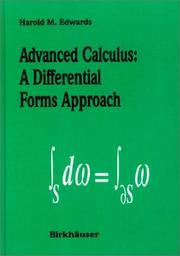
ISBN: 0817637079 3764337079 1461266882 146120271X Year: 1994 Publisher: Boston Birkhäuser
Abstract | Keywords | Export | Availability | Bookmark
 Loading...
Loading...Choose an application
- Reference Manager
- EndNote
- RefWorks (Direct export to RefWorks)
Calculus. --- Mathematical analysis --- Calculus
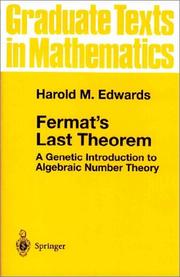
ISBN: 0387902309 3540902309 9780387902302 Year: 1977 Volume: 50 Publisher: New York (N.Y.): Springer,
Abstract | Keywords | Export | Availability | Bookmark
 Loading...
Loading...Choose an application
- Reference Manager
- EndNote
- RefWorks (Direct export to RefWorks)
Number theory --- Fermat's last theorem --- Théorie des nombres algébriques --- Fermat, Grand théorème de --- priem --- kwadraten --- dirichlet --- pell --- klasse --- geheel --- binair --- euler --- kummer --- deling --- 511.343 --- Last theorem, Fermat's --- Diophantine analysis --- Fermat's theorem --- Forms of higher degree. Fermat's last theorem --- Algebraic number theory. --- Fermat's last theorem. --- 511.343 Forms of higher degree. Fermat's last theorem --- Théorie des nombres algébriques --- Fermat, Grand théorème de --- Algebraic number theory --- #WWIS:d.d. Prof. L. Bouckaert/ALTO --- geschiedenis --- Gauss --- Nombres algébriques, Théorie des --- Nombres, Théorie des --- de Fermat, P.
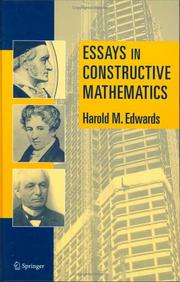
ISBN: 0387219781 1489990186 9786610803491 1280803495 0387271309 9780387219783 Year: 2005 Publisher: New York (N.Y.): Springer,
Abstract | Keywords | Export | Availability | Bookmark
 Loading...
Loading...Choose an application
- Reference Manager
- EndNote
- RefWorks (Direct export to RefWorks)

ISBN: 1281763446 9786611763442 0080873731 9780080873732 9780122327506 0122327500 Year: 1974 Volume: 58 Publisher: New York: Academic press,
Abstract | Keywords | Export | Availability | Bookmark
 Loading...
Loading...Choose an application
- Reference Manager
- EndNote
- RefWorks (Direct export to RefWorks)
RiemannÆs zeta function
Number theory. --- Functions, Zeta. --- Zeta functions --- Number study --- Numbers, Theory of --- Algebra --- Functions, Zeta --- Number theory --- 511 --- 511 Number theory --- 511.3 --- 511.3 Analytical, additive and other number-theory problems. Diophantine approximations --- Analytical, additive and other number-theory problems. Diophantine approximations --- Numbers, Prime --- Nombres premiers --- Number Theory --- Numbers, Prime. --- Fonctions zêta --- Riemann, B. --- Fourier analysis --- Numerical analysis --- Fonctions speciales --- Fonctions zeta
Book
ISBN: 3030985571 303098558X Year: 2022 Publisher: Cham, Switzerland : Springer,
Abstract | Keywords | Export | Availability | Bookmark
 Loading...
Loading...Choose an application
- Reference Manager
- EndNote
- RefWorks (Direct export to RefWorks)
| Listing 1 - 10 of 19 | << page >> |
Sort by
|

 Search
Search Feedback
Feedback About UniCat
About UniCat  Help
Help News
News